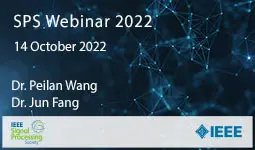JOINT RADAR-COMMUNICATIONS PROCESSING FROM A DUAL-BLIND DECONVOLUTION PERSPECTIVE
Edwin Vargas, Roman Jacome, Henry Arguello, Kumar Vijay Mishra, Brian Sadler
-
Members: FreeSPS
IEEE Members: $11.00
Non-members: $15.00Length: 00:15:13
10 May 2022
We consider a general spectral coexistence scenario, wherein the channels and transmit signals of both radar and communications systems are unknown at the receiver. In this \textit{dual-blind deconvolution} (DBD) problem, a common receiver admits the multi-carrier wireless communications signal that is overlaid with the radar signal reflected-off multiple targets. When the radar receiver is not collocated with the transmitter, such as in passive or multistatic radars, the transmitted signal is also unknown apart from the target parameters. Similarly, apart from the transmitted messages, the communications channel may also be unknown in dynamic environments such as vehicular networks. As a result, the estimation of unknown target and communications parameters in a DBD scenario is highly challenging. In this work, we exploit the sparsity of the channel to solve DBD by casting it as an atomic norm minimization problem. Our theoretical analyses and numerical experiments demonstrate perfect recovery of continuous-valued range-time and Doppler velocities of multiple targets as well as delay-Doppler communications channel parameters using uniformly-spaced time samples in the dual-blind receiver.



